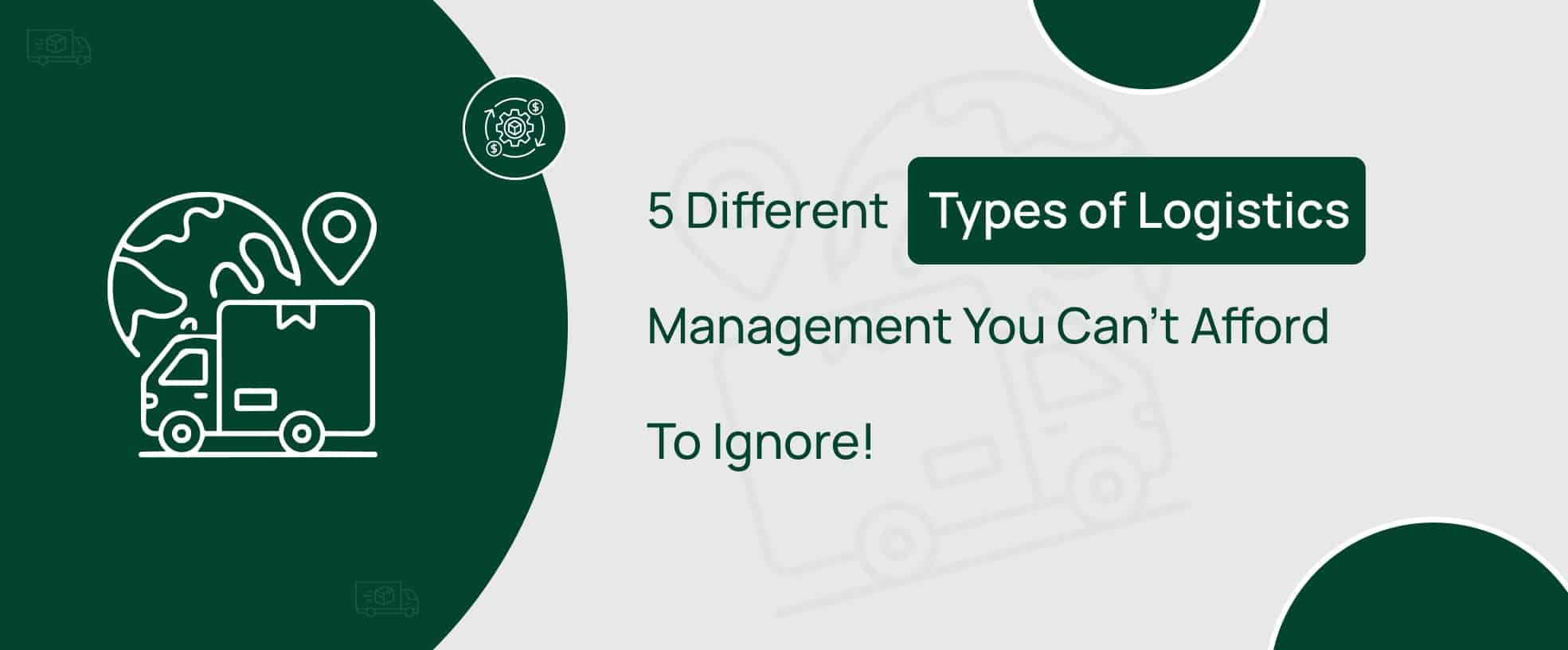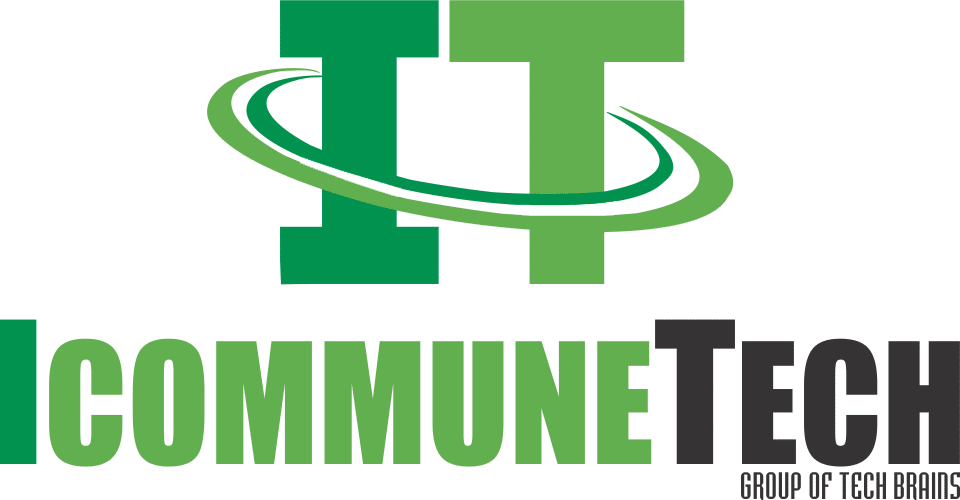5 Different Types of Logistics Management You Can’t Afford To Ignore

Smart logistics is the future. It’s not just about moving goods but about leveraging data-driven insights to enhance efficiency and reduce costs. – Dr. Pusphedra P. Singh
Knowing logistics and realizing its importance is not enough. Here are the types of logistics in detail that every business leader, supply chain manager, and aspiring business must know!
Just picture a scenario where your supplies reach precisely the time and place where they are actually required. This is what logistics does. Logistics is planning, monitoring, managing, and streamlining the supplies from when they enter the supply chain until they reach the customers.
In the customer-centric world, logistics is the fuel that drives the wagon of e-commerce/retail businesses forward. It is behind every commodity that you use daily, from the morning toothbrush to the critical medical supplies you need.
Logistics is not just about managing warehouse operations; it is about keeping customers satisfied, having an edge in competitive marketing, and making profits.
Customers want the right product in the right condition and on time. Logistics plays an important role in fulfilling these expectations. Quick, dependable, and transparent logistics improve customers’ trust and loyalty. They also reduce return rates and form long-term relations with the customers.
The five major types of logistics are inbound, outbound, reverse, third-party, and fourth-party logistics.
Little-Known Statistics About Logistics That Uncover The Hidden Truth
Here are a few little-known statistics about logistics:
- The global logistics market was valued just above $8.4 trillion euros in 2021 and is projected to reach $13.7 trillion euros by 2027. [1]
- The U.S 3rd party logistics market size was estimated at 247.4 billion in FY 2023, and it is projected to grow at a CAGR Compound Annual Growth Rate of 9.2% from 2024-2030. [2]
- Inventory carrying costs comprise 20%-30% of the total value of the inventory yearly. [3]
- In Japan, 57.6% of logistics expenses are transportation, 16.4% are storage, and 26.0% are miscellaneous. [4]
If you are an aspiring business professional who knows how to start a logistics company , understand the types of logistics and their importance. This will help you make smarter decisions and improve your proficiency.
Now that you know the basics, let us understand in detail about the five major logistics types.
5 Major Types of Logistics in Supply Chain Management
Five major types of logistics in supply chain management that manage different purposes are as follows:
#1 – Inbound Logistics:
Inbound logistics is an important part of the supply chain. It focuses on managing the flow of raw materials, finished goods, and components into the supply chain. The inbound logistics process includes various steps, from receiving the order to maintaining storage, transportation, and incoming supplies.
Simply put, inbound logistics is receiving, storing, and managing supplies in a business unit. For instance, a car manufacturing unit receives shipments of tires, engines, and other electronic components from suppliers. Then, it unloads, transports, and stores them in the warehouse before they reach the production unit. This is inbound logistics.
#2 – Outbound Logistics:
Outbound logistics involves moving finished goods from businesses to the end customers. It entails processing orders, picking, packing, shipping, labeling, and delivery. In short, this type of logistics prepares orders for the final delivery
An order fulfillment center picks, packs, labels, loads onto trucks, and finally ships and tracks orders to reach customers safely and on time. This is an example of outbound logistics.
#3 – Reverse Logistics:
As its name suggests, reverse or return logistics means moving goods from the customers back to the manufacturing unit. This does not necessarily include returns but sometimes recycling, repairs, or even disposal.
This reverse logistics process saves the environment and leads to high customer satisfaction. For example, Apple has a recycling program where iPhone users can return their old mobiles or other Apple devices. The usable ones are refurbished, and returned to the supply chain, and the rest are recycled.
#4 – Third-Party Logistics (3PL)
Third-party logistics providers offer supply chain management services. These services include warehousing, order fulfillment, transposition, freight forwarding, or packaging. To simplify, a third-party logistics service provider links businesses to the customers.
It handles one or more logistics so the company can focus on other core activities like marketing, product development, etc. For instance, DHL is a top third-party logistics service provider that uses AI in logistics to handle warehouse order fulfillment, reverse logistics, fulfillment, etc.
#5 – Fourth Party Logistics (4PL)
Fourth-party logistics (4PL) service provider is a business model in which a single body handles logistics and supply chain management. This company is responsible for handling all the logistics operations for its clients. Consolidating multiple logistics providers into one helps businesses increase efficiency and reduce costs greatly. Hence, 4PL service providers are popularly used for businesses of all sizes.
Accenture is an example of a 4PL or Fourth-party logistics provider. Logistics businesses rely on Accenture to design and manage their supply chain networks. The global giant does not own warehouses or logistics; it leverages IoT in logistics and transportation for other companies’ logistics operations.
7 Specialized Types of Logistics Strategies And Trends
With the evolution of technology, the entire logistics landscape has transformed for the better. Here are some of the top logistics strategies and trends.
1. E-commerce Logistics:
E-commerce logistics entails bringing supplies from sellers to customers. It focuses on order fulfillment, inventory tracking, last-mile delivery, transportation, and more. This trend is in high demand due to the rise of online shoppers.
2. Cold Chain Logistics:
This type of logistics deals with temperature/weather-sensitive deliveries. Food, beverages, and pharmaceuticals with unique, sensitive demands fall under this category. Cold chain logistics ensures that the supplies remain safe during transportation.
3. Humanitarian Logistics:
Humanitarian logistics specializes in organizing the warehousing and delivery of supplies during natural calamities or other contingencies that affect people in a particular area or zone. It is the cost-effective storage of supplies and materials that address human suffering.
4. Distribution Logistics:
Distribution logistics is the management of finished goods from the production unit until they reach the end customers. It is meant to control the flow of goods in a targeted manner to the end customers. The goods move between warehouses, production units, distribution centers, and finally, to the customers.
5. Procurement Logistics:
Procurement logistics is another type of logistics that requires strategic planning and execution to acquire materials and goods. This also includes sourcing warehouses and shipping to ensure a hassle-free flow of goods and smooth operations.
6. Military and Defense Logistics:
Military and Defense Logistics entails planning, execution, and resource management to support military operations. This includes acquiring, storing, and distributing the military and defense logistics.
This type of logistics entails acquiring, storing, shipping, and distributing the necessary supplies (equipment & others) and personnel to support and sustain military operations smoothly.
7. Green and Sustainable Logistics:
Green and sustainable logistics is meant to save the environment. They focus on eco-friendly practices, reduced emission levels, and sustainable packaging. This type of logistics is a step closer to a greener global future for e-commerce and saving the future.
What is The Entire Logistics Management Cycle?
The logistics management cycle entails all activities, from purchasing to delivering finished goods. It comprises warehousing, inventory management, transportation, reverse logistics, etc.
The logistics management cycle encompasses all the procurement and efficient coordination of activities procuring and redistributing supplies. Logistics is not necessarily confined to procurement and distribution activities; it comprises all the other activities, like picking, packing, labeling, and more. Here’s a quick look to be more precise:
Planning and Forecasting:
All the types of logistics start with the planning phase. Planning and forecasting are necessary to maintain supplies and meet customers’ demands. This phase consists of evaluating the data, the market trends, and occasional seasonal fluctuations.
With demand forecasting, just the right stocks are always maintained (Avoiding shortages and overproduction). This leads to better inventory management, cost-effectiveness, and overall efficiency.
Inventory and Warehousing:
This logistics cycle phase ensures that supplies are stored and available whenever required. It comprises various activities, such as route optimization, supply tracking, useful insights, etc.
Different types of logistics have different inventory and warehousing needs. Leveraging data-driven useful insights can lower transportation costs and improve transparency and customer satisfaction rates.
High Customer Satisfaction Rate:
The last phase of the logistics management cycle focuses on smooth returns and setting a loyal bond with customers. It is all about rewarding their loyalty. The phase comprises maintaining returns and continually supporting the customers. Also, giving them personal experiences and conducting loyalty programs helps customer retention.
Final Thoughts on Types of Logistics:
Logistics is the heart and soul of the supply chain. It does everything, whether planning or managing complex warehouse logistics, shipments, or customer service. Choosing the right logistics type according to the expertise and resources available is very important for your business’s success.
Key Takeaways:
- The process of planning, execution, management, and delivery of supplies is logistics.
- There are four types of logistics: inbound logistics, outbound logistics, reverse logistics, third-party logistics, and fourth-party logistics.
- The specialized logistics trends include Cold chain, e-commerce, humanitarian, and military logistics.
- Planning, forecasting, inventory management, and customer retention are the different phases of the logistics management cycle.
Frequently Asked Questions (FAQs)
We look forward to resolving your queries at any time!
1. What are the major types of logistics?
The major types of logistics are:
- Inbound Logistics
- Outbound Logistics
- Reverse Logistics
- Third-party logistics
- Fourth party logistics
2. What are the main objectives of logistics?
The main objective of logistics is to ensure that the supplies reach the right place, on time, and in the proper condition so that the customers are delighted and have a loyal bond with the companies.
3. What are the 7 C’s of logistics?
The 7 C’s denote the following:
- Customer
- Costs
- Convenience
- Communication
- Coordination
- Care
- Compliance
- Customer
These 7Cs ensure that customers are delighted and retained.
4. What are the 6 P’s of logistics?
The 6 P’s of the logistics are as follows:
- Products
- Price
- Place
- Promotion
- People
- Process
These P’s make clear the strategies for delivering supplies.
5. What are the 7 R’s of logistics?
The 7 R’s of the logistics are as follows:
- Right Price
- Right Customers
- Right Time
- Right Place
- Right Conditions
- Right Quality
- Right Condition
These 7Rs are essential for the satisfaction of customers.
How Can iCommuneTech Help You?
iCommuneTech is a trusted name, and several customers worldwide count on it for the best ongoing tech support. Our company specializes in providing you with updated and end-to-end logistics solutions.
Our cutting-edge software, CommuteLogix, helps you optimize all logistics operations. So, look no further and
Contact us today to find the best logistics solutions.
Irshad Pathan

Web Development Expert
Irshad is a senior technical expert at iCommuneTech. He manages the iCommuneTech's Web Development Team, and has hands-on expertise in web development, Laravel development, Logistics, fleet management, and Supply Chain Management. He mentors the in-house team and enjoys describing his experience in words.
